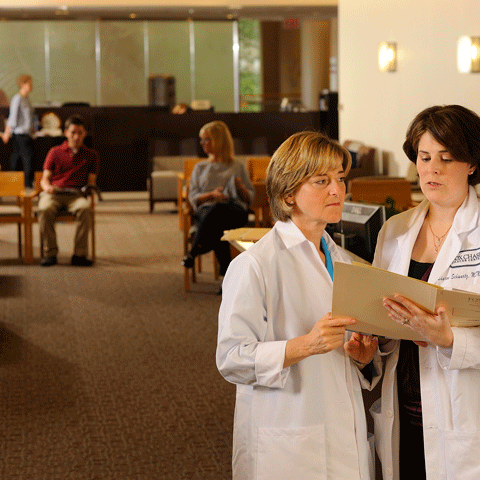
Patient and Family-Centered Care at Fox Chase
-
Going back to college as an adult was a challenge I was prepared for.
I was not prepared for the news I would receive a few weeks into my second semester: my wife was diagnosed with stage three ovarian cancer. After hearing this news, I left school, but she decided that she wanted me to finish and see me “walk,” so I returned during a brief period of remission. Her simple request became my driving force to finish school. For the remaining time at school, I was my wife’s caregiver, together with her mother and father. The three of us were fortunate to have employers who understood and gave us the freedom of schedule we needed. We were also fortunate to be at Fox Chase Cancer Center.
My wife lost her battle on February 25, 2011 after an almost two year fight. Over these two years, the hospital became a second address. I even decided to turn my tourism and hospitality major into a study of hospital tourism and hospitality. I can say that Fox Chase was amazing from the start. There were times that the nurses who took care of my wife brought me to tears because of their compassion and dedication. They didn’t take away or diminish the role we had as her caregivers. Still, thanks to my studies, I knew I could work to improve the caregiver experience at Fox Chase. This is what led me to the Patient and Family Advisory Council (PFAC) at Fox Chase.
The council, a voluntary group of patients and family members as well as key Fox Chase administrators and staff, seeks to promote the use of patient- and family-centered care throughout the institution.
Patient- and family-centered care is an approach to the planning, delivery and evaluation of healthcare that is grounded in mutually beneficial partnerships among healthcare providers, patients and families. It redefines the relationships in healthcare.
Patient- and family-centered practitioners recognize the vital role that families play in ensuring the health and well-being of infants, children, adolescents and family members of all ages. They acknowledge that emotional, social, and developmental support are integral components of health care. They promote the health and well-being of individuals and families and restore dignity and control to them. Patient- and family-centered care is an approach to health care that shapes policies, programs, facility design, and staff members’ day-to-day interactions. It leads to better health outcomes, wiser allocations of resources, and greater patient and family satisfaction.
The core concepts of patient- and family-centered care are:
- Dignity and Respect - To listen to and honor patient and family ideas and choices and to use patient and family knowledge, values, beliefs and cultural backgrounds to improve care planning and delivery.
- Information Sharing - To communicate and share complete and unbiased information with patients and families in useful ways. Patients and families receive timely, complete and accurate details so they can take part in care and decision-making.
- Involvement - To encourage and support patients and families in care and decision making at the level they choose.
- Collaboration - To invite patients and family members to work together with healthcare staff to develop and evaluate policies and programs.
By championing these concepts, PFAC aims to serve as a “voice” for patients who have received cancer treatment at Fox Chase and their family members. The council is dedicated to strengthening collaboration between patients and family members and the healthcare team so as to enhance the Center’s ability to deliver the highest standard of safe, comprehensive and compassionate healthcare.
PFAC currently includes 10 patients and family members; a physician champion; and staff representatives from clinic administration, hospital administration, social services, nursing, quality management, and other departments. The council is facilitated by patient or family co-chairs.
To find out more about us visit our website.
